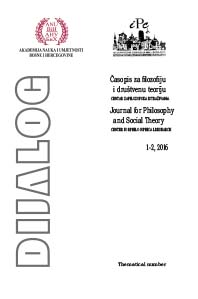Encounters and inter-group relations in diverse urban contexts: Reflecting on research fieldwork in Italy
Encounters and inter-group relations in diverse urban contexts: Reflecting on research fieldwork in Italy
Author(s): Roberta Marzorati, Michela SemprebonSubject(s): Politics / Political Sciences, Migration Studies, Inter-Ethnic Relations, Ethnic Minorities Studies, Politics and Identity
Published by: Akademija Nauka i Umjetnosti Bosne i Hercegovine
Keywords: encounter; diversity; migrants; social cohesion; urban space;
Summary/Abstract: Increasing diversity causes preoccupation about the possibility of living to¬gether in European cities, particularly in relation to on-going migration flows. Encounter in public and semi-public spaces is considered key to overcome supposedly incompatible cultural practices and conducts and to foster a more cohesive and just society. The paper reflects on encounter by drawing from dif¬ferent qualitative pieces of research that dealt with migration narratives, prac¬tices and policies in diverse Italian urban spaces. To describe and interpret the forms of encounters and the dynamics emerging from these research works, three analytical categories will be put forward: possible encounter, engineered encounter, denied encounter. These categories will then be used as interpreta¬tive frames aimed at a nuanced understanding of the nature of encounter, the conditions under which it takes place and the possible outcomes associated with it, including unexpected/unpredictable outcomes. The paper will also ad¬dress the question of whether such dynamics should be governed and to which extent this can promote positive outcomes. The ultimate goal is to contribute to the debate on social inclusion and social cohesion and to elaborate on the extent to which encounter can favour their improvement. In line with much lit¬erature, it will conclude that while encounter does not necessarily foster social cohesion, it can contribute to positive outcomes in this direction, also with the support of governance tools.
Journal: Dijalog - Časopis za filozofiju i društvenu teoriju
- Issue Year: 2016
- Issue No: 01+02
- Page Range: 37-52
- Page Count: 16
- Language: English

